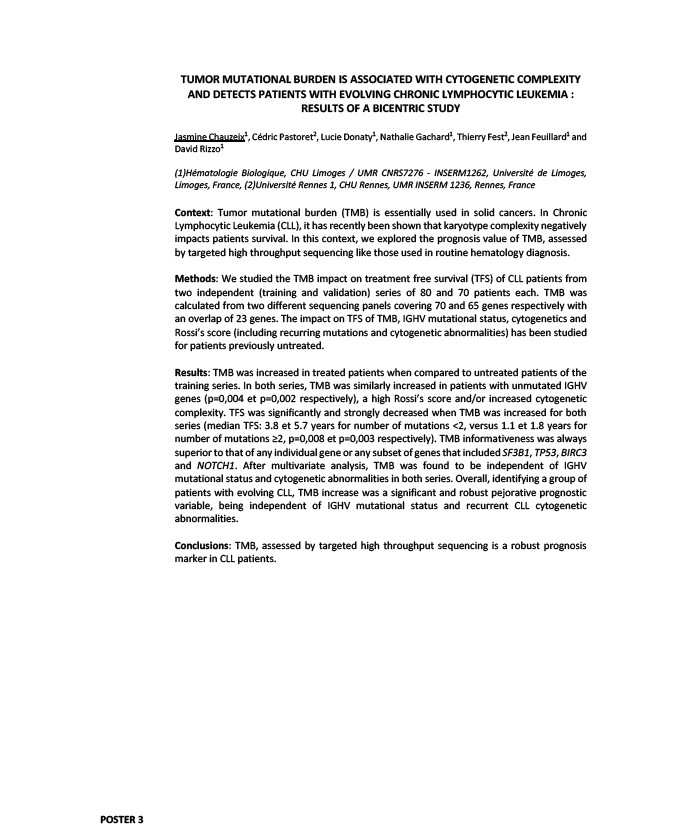
TUMOR MUTATIONAL BURDEN IS ASSOCIATED WITH CYTOGENETIC COMPLEXITY
AND DETECTS PATIENTS WITH EVOLVING CHRONIC LYMPHOCYTIC LEUKEMIA :
RESULTS OF A BICENTRIC STUDY
Jasmine Chauzeix1, Cédric Pastoret2, Lucie Donaty1, Nathalie Gachard1, Thierry Fest2, Jean Feuillard1 and
David Rizzo1
(1)Hématologie Biologique, CHU Limoges / UMR CNRS7276 - INSERM1262, Université de Limoges,
Limoges, France, (2)Université Rennes 1, CHU Rennes, UMR INSERM 1236, Rennes, France
Context: Tumor mutational burden (TMB) is essentially used in solid cancers. In Chronic
Lymphocytic Leukemia (CLL), it has recently been shown that karyotype complexity negatively
impacts patients survival. In this context, we explored the prognosis value of TMB, assessed
by targeted high throughput sequencing like those used in routine hematology diagnosis.
Methods: We studied the TMB impact on treatment free survival (TFS) of CLL patients from
two independent (training and validation) series of 80 and 70 patients each. TMB was
calculated from two different sequencing panels covering 70 and 65 genes respectively with
an overlap of 23 genes. The impact on TFS of TMB, IGHV mutational status, cytogenetics and
Rossi’s score (including recurring mutations and cytogenetic abnormalities) has been studied
for patients previously untreated.
Results: TMB was increased in treated patients when compared to untreated patients of the
training series. In both series, TMB was similarly increased in patients with unmutated IGHV
genes (p=0,004 et p=0,002 respectively), a high Rossi’s score and/or increased cytogenetic
complexity. TFS was significantly and strongly decreased when TMB was increased for both
series (median TFS: 3.8 et 5.7 years for number of mutations <2, versus 1.1 et 1.8 years for
number of mutations ≥2, p=0,008 et p=0,003 respectively). TMB informativeness was always
superior to that of any individual gene or any subset of genes that included SF3B1, TP53, BIRC3
and NOTCH1. After multivariate analysis, TMB was found to be independent of IGHV
mutational status and cytogenetic abnormalities in both series. Overall, identifying a group of
patients with evolving CLL, TMB increase was a significant and robust pejorative prognostic
variable, being independent of IGHV mutational status and recurrent CLL cytogenetic
abnormalities.
Conclusions: TMB, assessed by targeted high throughput sequencing is a robust prognosis
marker in CLL patients.
POSTER 3